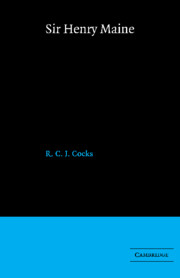5 - THE DECLINE OF A JURIST
Published online by Cambridge University Press: 29 September 2009
Summary
‘VILLAGE COMMUNITIES’
Most commentators on Maine see his works of the 1870s as an elaboration of the ideas to be found in Ancient Law. They stress the element of continuity in Maine's thought, and point out that he was now attempting to relate some of his old ideas to the work of other scholars at Oxford who were engaged in comparative social studies. For example, we know that at this time Maine was interested in Max Muller's more recent work with comparative philology, E. B. Tylor's studies in anthropology, William Stubbs’ historical writings and Andrew Lang's treatment of mythology.
It is easy to see why a work like Village Communities, published in 1871, can be seen in this light. Much of it is taken up with a comparison between the origins of European property law and Maine's previous ideas about Indian systems of land holding. He had given his first series of Oxford lectures in 1870 and by working on the book during the summer of that year he had made his lectures, and two additional articles, suitable for publication in the following spring. As before, the explanatory theme designed to hold together his various ideas was the transition from forms of joint ownership arising out of status relationships to individual ownership reflected, to an ever increasing extent, in the development of contractual rights.
- Type
- Chapter
- Information
- Sir Henry MaineA Study in Victorian Jurisprudence, pp. 101 - 140Publisher: Cambridge University PressPrint publication year: 1988



